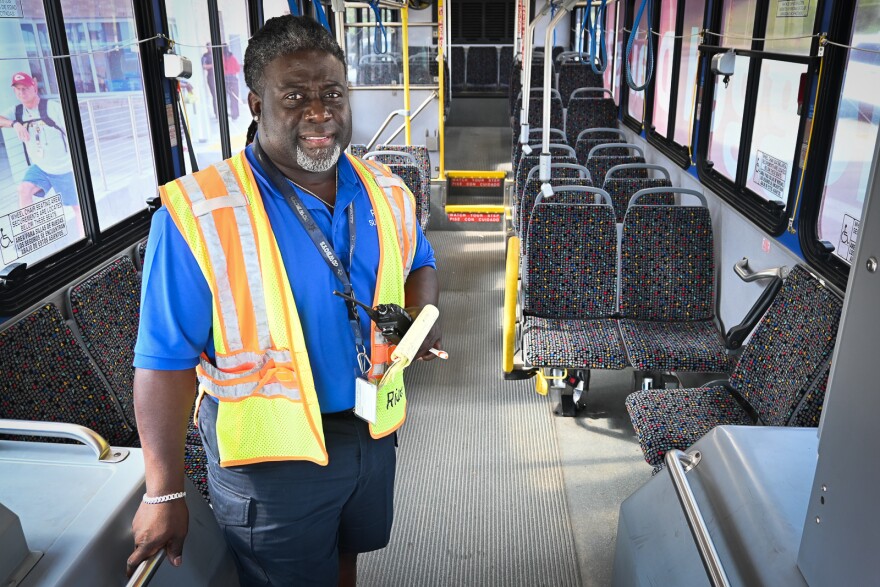At around 4 p.m. on a Thursday in early June, the bus heading north on Troost Ave. came to a halt between stops. An elderly woman was supposed to get off on 39th Street, but she didn’t make it and the operator was continuing to 37th Street when she yelled at him to stop.
Another passenger, a woman in her late 50s, also started yelling for the driver to let the first woman off. The driver stopped and called for a supervisor.
Arriving within minutes was Ken Lewis, his dreadlocks neatly tied in a ponytail at the back of his head and a radio in his hand.
Lewis is a district road supervisor for the Kansas City Area Transportation Authority. He told the women to calm down, that he was here to resolve the matter.
Meanwhile, the bus full of passengers shouted out in a chorus of frustration to start the bus.
The second woman was so aggressive, yelling and threatening the driver, that Lewis asked her to exit the bus. As she stepped off, she threw a cup filled with ice cubes at the windshield, swearing at both Lewis and the driver.
After patiently listening to the elderly woman who had missed her stop, Lewis said he would drive her back to her stop in his car. He asked the driver if everything was OK, then let him continue the route.
“This is nothing,” Lewis said of the incident. “There are situations that are more hostile at times."
Lewis is one of 10 road supervisors working seven districts within the KCATA. He’s worked there for nearly a decade, first as a bus operator. He found it fulfilling to get passengers to their destinations. Now he works District 3, everything west of Troost from 27th to 135th street.
These supervisors are on duty every day from 4 a.m. to 1:30 a.m., supporting at least 400 bus operators along 57 routes with 3,500 stops in Kansas City, Missouri.

Not a day goes by without some sort of incident.
"Sometimes in a day, I have to mediate conflicts between the passengers and bus operators three to five times a day, ranging from mild to serious," Lewis said.
A dispatcher from the KCATA’s operational control center road supervisors to disturbances on buses or at bus stops, as well as to accidents and re-routes that become necessary for reasons that don’t involve RideKC.
Sometimes the dispatcher issues an “all call,” using an intercom system to let everyone on a bus know that supervisors, police officers and security guards are on their way and they should exit the bus.
If a situation is difficult to defuse or gets out of control, there are two Kansas City Police Department officers on duty and at least seven Titan security guards supporting the supervisors.
"They are on the scene within three to four minutes to ensure there is no danger to bus operators or passengers," Lewis said.
Sometimes it's a challenge to deal with each personality.
"Every situation and every call are different, and we have to be patient and proceed with safety," he said.
"Sometimes it can be overwhelming, but I look forward to my job every day."KCATA district road supervisor Ken Lewis
Lewis starts his days at 7 a.m. by driving around his district to check on people who sleep in bus shelters, waking them up to make room for passengers to sit and wait for the bus.
He then helps passengers who have questions about routes, buses and schedules, and checks on the bus operators.
"I also do a health and welfare check on my operators to see how they are doing and how their day is going. Sometimes I also ask them about how their families are doing,” said the 54-year-father of four children and five grandchildren. “I try to give them a good advice if needed."
Sometimes passengers might turn their frustrations on Lewis. Anyone who is involved in a dispute that causes disruption is banned from riding the bus for a day. If a passenger assaults the bus operator, they will be banned for six months to one year, sometimes indefinitely, depending on the severity of the case or whether the person is a repeat offender.
Usually Lewis waits for police or security officers to arrive, but if he happens to be first at the scene, his main task is to make sure the driver and passengers are safe. He then tries to remove the disruptive person from the bus by talking to them.
Most of the time, he's able to escort the disruptive person off the bus so the situation doesn't get out of hand and there is no interruption of services.
"Our primary goal is the safety of bus operators and the passengers when conflicts arise on the bus. I first apologize to the passengers for any inconvenience caused," Lewis said.
Even when passengers disrespect or swear at them, Lewis said, he and his operators are not demoralized because there are other people who appreciate their work.
He remembered a situation back in May 2021, when a woman left a make-up bag containing hundreds of dollars on the bus. The operator knew the woman, and called the operations center, where a dispatcher put in a call to Lewis.
He found the woman, who he now knows as Ms. Moss, walking near her home and escorted her to RideKC headquarters to pick up the bag.
"Sometimes it can be overwhelming,” he said, “but I look forward to my job every day and I enjoy my job. Dealing with the public, meeting people from all different walks of life and the operators of Ride KC."






